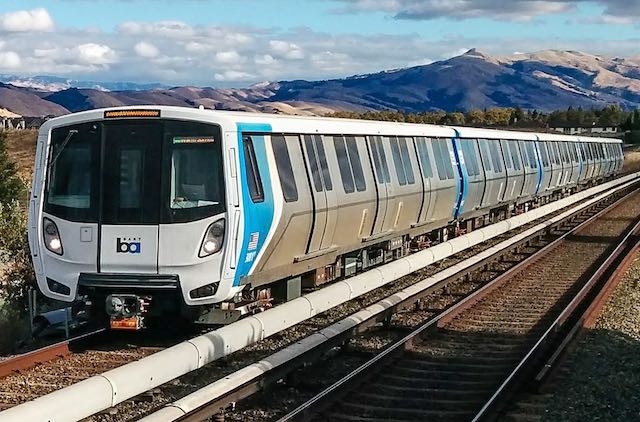The San Francisco Bay Area Rapid Transit Authority (BART) spends a lot of money, and anytime a government agency has a lot of money to spend, there is a potential for corruption. For example, a month ago it was revealed that BART spent $350,000 to help one homeless person.
These $2 million cars were recently delivered to BART along with three times the service delays as the 40-year-old cars they replaced, which is a problem that should have been examined by the inspector general.
That revelation came from the BART Inspector General’s office, which was created in 2018 (about 50 years too late) to monitor BART spending. But BART itself hasn’t been too thrilled about having someone look over its shoulder.
Last year, a grand jury found that “both BART’s board and management impeded the IG’s efforts to conduct independent oversight” and “supported union efforts to limit OIG access to their members.” This “stymied OIG independence and the confidentiality of investigations.” Photo by Bombardier.
“There comes a point where you just say, ‘I can’t deal with this anymore,'” Harriet Richardson, BART’s inspector general, told a reporter. As a result, she is resigning this week just four months before the end of her term. BART is “probably the least effective agency I’ve worked for” when it comes to dealing with oversight, she added.
In her three-and-a-half years of service, Richardson found “tens of millions of dollars in fraud, conflict of interest and wasteful financial practices,” says California state Senator Steve Glazer. But apparently BART didn’t want to know about those problems.
You’d think that BART would welcome any new ideas that would save it money. Its farebox revenues declined from $470 million in 2019 to under $60 million in 2021 and as of January ridership was still only a third of pre-pandemic levels. Despite the drastic decline in ridership, it reduced its operating costs by just $40 million in 2021 and continues to operate 90 percent as many trains as it did before the pandemic. As a result, it expects to run out of federal COVID relief funds much sooner than most other transit agencies.
Rather than do anything about this, BART expects taxpayers to pony up the funds to allow it to keep its empty trains going. Since a high percentage of riders today are not the kind of people you would be happy to meet in a dark alley, BART’s ridership may never really recover, but the agency wants to keep spending as if it will.









A house fire will eventually burn itself out when it runs out of stuff that burns. BART lumbers along as tax payers continue pouring trainloads of cash on the smoldering ashes.
BART is currently using federal emergency funds to run service and balance our operating budget. Those relief funds are projected to run out in 2025. If new funding is not secured, BART is facing devastating cuts that will have serious impacts on the quality of life in the Bay Area.
Fiscal Cliff Financial Crisis
Devastating!
Sounds like BART will run out of money before they sort out what tax increases they’ll be asking for.
https://www.sfchronicle.com/projects/2023/bart-finance-qa/
Officials have not discussed what kind of tax that measure would be, and Bay Area transit agencies could band together to ask voters’ approval on a mega measure in 2026.
Well, last Friday I commented that BART service has degraded severely. This provides an explanation.
Why shouldn’t the “let them fail” principle apply to public transportation, as well as banks? If there should be consequences for making bad decisions with bank customers’ money, why shouldn’t there be consequences for making bad decisions with taxpayers’ money?
https://fee.org/articles/why-we-should-let-bad-banks-fail/